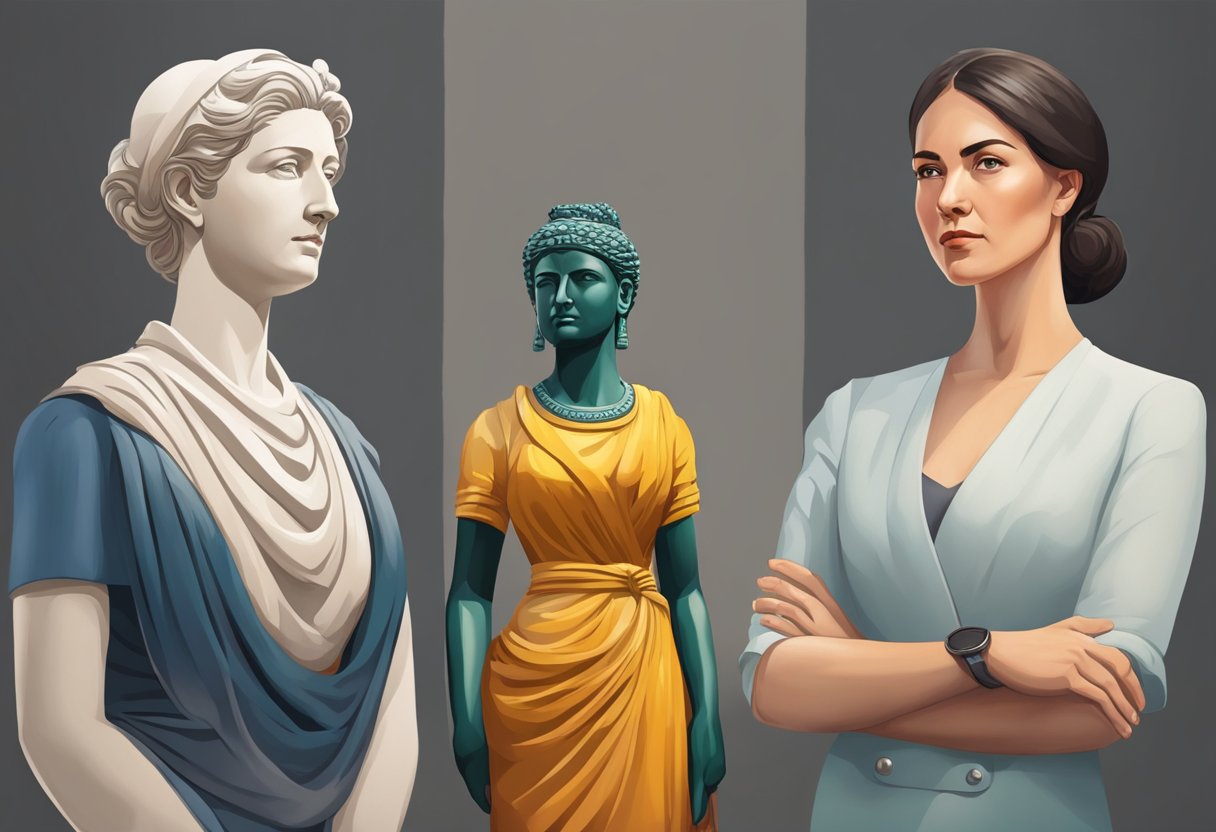Historical and Modern Stoic Women

This section explores key figures among Stoic women through history, from the early Stoic thinkers to the influential women shaping modern Stoicism.
Influential Ancient Stoic Women
Porcia Catonis (Porcia Cato) is a figure of Stoic philosophy and courage. As the wife of Brutus, one of Julius Caesar’s assassins, she is known for her suicide, which was an assertion of her Stoic beliefs. Another notable figure is Annia Cornificia Faustina Minor, sister to Roman emperor Marcus Aurelius, who was likely exposed to Stoicism through her brother’s philosophical pursuits. Her life, though not as documented as her brother’s, demonstrates women’s engagement with Stoic philosophy in the ancient world.
The philosopher Hipparchia of Maroneia is one of the few recognized women philosophers of ancient Greece. Although a Cynic herself, her life intertwined with Stoicism through her marriage to Crates of Thebes and her philosophical work, demonstrating early examples of women philosophers in a predominantly male domain.
Contributions of Modern Stoic Women
Moving to contemporary times, Nancy Sherman stands out with her work on Stoicism, particularly regarding its impact on military ethics and the modern adapting of classical philosophy to address today’s challenges. Arianna Huffington has applied Stoic principles to the realms of business and personal well-being, advocating for the power of resilience that Stoicism can instill.
Scholars like Emily Wilson have contributed through new translations of ancient Stoic works, making them accessible and relevant for today’s readers. Authors Brittany Polat and Sharon Lebell have also played substantial roles in the modern Stoicism movement, with writings that reinterpret Stoic teachings for contemporary audiences, emphasizing their applicability and utility in modern life.
Cultural and Educational Perspectives

Stoicism’s influence is particularly evident in the way it has shaped cultural norms and the education system. Through the lens of literature and academic discourse, Stoicism encourages critical thought into the roles and capabilities of women.
Stoicism in Literature and Education
Literature has been a vehicle through which Stoic virtues have traversed centuries, influencing educational content and perspectives. Classic works such as “The Odyssey” have been integral in propelling Stoic ideas into the curriculum of many universities and forming part of the foundation of classics and philosophy courses. Influential Stoic philosophers like Musonius Rufus emphasized the importance of education for all, asserting the equal capacity of women and men for virtue and reason, thereby promoting gender inclusivity in education.
Letters and personal writings of Stoics, including those from Seneca and Epictetus, have served as educational resources, demonstrating practical applications of Stoicism. These writings provide insights into how Stoicism can be incorporated into daily conversation and thought processes within a graduate school setting or an online symposium.
Stoicism in Politics and Society
Politics and society have seen the imprints of Stoic philosophy through figures such as Cato, who embodied Stoic ideals. Notions of justice and temperance, central to Stoic thought, have filtered into political discourse, encouraging leaders and citizens alike to engage with Stoic concepts.
Moreover, public and educational institutions have utilized Stoic philosophy as a means to approach contemporary societal issues with a lens that emphasizes rationality and virtue. The discussions around Stoicism in political and social contexts are not just theoretical but have applicability in crafting policies and fostering a culture of resilience and integrity.
Challenges and Critiques

Stoicism, with its roots in ancient philosophy, faces contemporary analysis and critique, particularly on its applications for women. Critics argue the philosophy has historical and structural barriers that may limit its inclusivity and relevance to women’s experiences today.
Stoicism and the Modern Critique
Stoicism is often critiqued for its perceived incompatibility with modern ideologies, particularly those that emphasize the ‘personal is political’. Critics argue that by focusing on individual virtue and internal control, Stoicism could potentially overlook systemic issues that women face, such as gender discrimination. Concerns are also raised about Stoicism’s engagement with ‘traditional’ roles in areas like marriage and religion, which may seem to reinforce rather than challenge existing power structures. For instance, a review at the Daily Stoic discusses Stoicism’s historical context and its significant male orientation in ancient times.
Overcoming Barriers to Practice
Despite its critics, many women find Stoicism a robust framework for personal development, though barriers to practice can exist. To overcome these barriers, they seek interpretations of Stoicism that are inclusive and align with contemporary values, including feminism. Changes in ideology can also facilitate the re-examination of traditional texts to recover or reinterpret female voices in Stoicism. Channels like the Modern Stoicism platform offer resources and communities aimed at inclusivity. Thus, while challenges persist, the potential to adapt and integrate Stoic principles into a diverse range of lived experiences remains vibrant and evolving.
Stoic Community and Resources
Stoicism is not just an individual practice but thrives within a community setting where resources are shared to support practitioners’ growth. The global landscape of Stoicism for women is supported by various movements tailored to address modern needs, while the availability of resources provides the necessary tools for individual exploration.
Global Stoic Movements
The Daily Stoic, an online hub of Stoic wisdom, offers a diverse community where women’s past and present contributions to Stoicism are acknowledged and celebrated. This platform caters to a modern Stoic community looking to apply Stoic principles in today’s context. It includes discussions on figures like Portia, the wife of Brutus and a Stoic in her own right, reflecting on how such ancient influences resonate with modern Stoics. Involvement with these groups supports autonomy and the development of personal philosophy aligned with Stoic teachings.
Accessing Stoic Resources
When seeking out Stoic literature and learning materials, one can turn to organizations like The Stoic Fellowship, which serves as a bridge for connecting groups around the world. They are on a mission to curate the best Stoic resources, ranging from printed texts to digital content. Insightful publications from modern Stoic figures such as Martha Nussbaum address the application of Stoicism in the context of women and gender, providing a rich intellectual ground for further exploration. These resources aim to equip individuals with the knowledge to cultivate wisdom and apply Stoic practices to daily life.
Conclusion
Stoicism has long been regarded as a philosophy that transcends gender, advocating for virtue and rationality as the highest goods. It teaches individuals to detach from external events and focus on their internal responses. This quality is particularly empowering for women, who have historically faced societal challenges concerning emotional expression and personal autonomy.
Stoicism provides a framework for women to exercise control over their reactions and to cultivate resilience. It supports the notion that personal worth is independent of external validation, which is a valuable perspective in the quest for gender equality. It’s not surprising then that women throughout history, like the eloquent Portia, have found strength in Stoic practices.
Furthermore, modern interpretations of Stoicism continue to contribute to dialogues on feminism and women’s rights. By interpreting Stoic concepts through a contemporary lens, advocates suggest that stoicism can assist in overcoming entrenched gender norms.
In considering the history and ongoing discussion, it becomes evident that Stoicism holds significant possibilities for empowering women. Through its tenets of emotional regulation and ethical living, Stoicism encourages a balanced approach to life’s adversities, contributing positively to personal development and societal equality. This is why Stoicism is not only relevant but also a valuable resource for women seeking empowerment.
Frequently Asked Questions
Stoicism has gained traction among diverse audiences, including women who adapt its principles to meet unique life challenges. This section addresses common inquiries regarding Stoicism’s relevance to women, highlighting historical figures, relevant literature, and the nature of stoic relationships and personality traits.
How can Stoicism be applied to the specific challenges women face?
Stoic philosophy teaches resilience and emotional control, which can empower women to navigate societal pressures and personal obstacles with equanimity and strength.
What are some inspiring quotes by female Stoics?
Female Stoics like Hipparchia of Maroneia have left a legacy of wisdom, urging individuals to live in harmony with nature and to challenge societal norms that restrict personal freedom.
Who are some notable women in the history of Stoicism?
Notable women in Stoic history include Portia Catonis, reputed for her strength and stoic resolve, and Hipparchia of Maroneia, who actively engaged with Stoicism in the ancient world.
What books explore Stoicism from a woman’s perspective?
Literature such as “A Universal Philosophy: Great Insights From Female Stoics” from Daily Stoic provides insights into Stoicism through the experiences and perspectives of women throughout history.
How does dating a stoic woman differ from traditional dating dynamics?
Dating a stoic woman may involve clear communication, mutual respect, and a relationship grounded in rationality rather than emotional volatility.
What characteristics define a stoic female personality?
Characteristics of a stoic female personality include a composed demeanor, resilience in the face of adversity, and a commitment to personal growth and ethical living.





